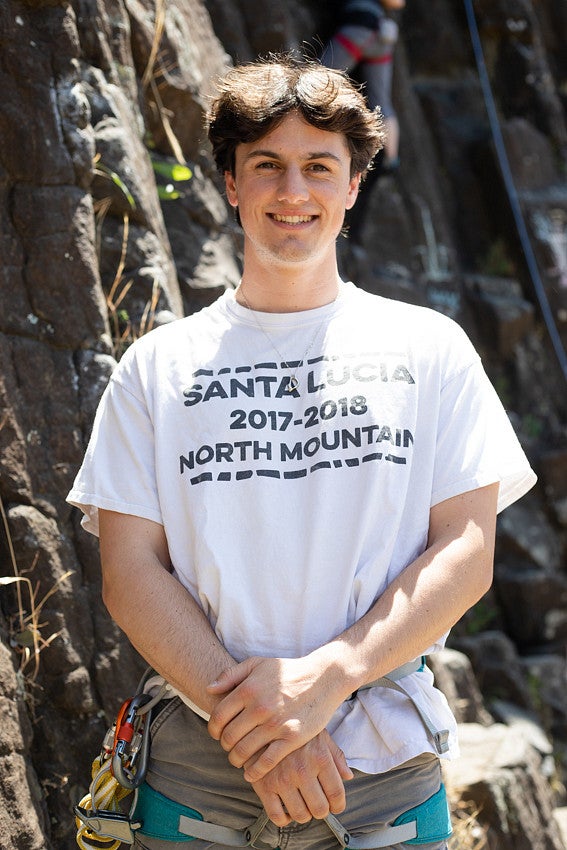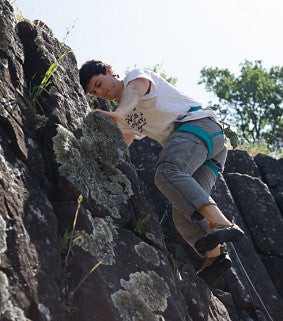Aaron Georis: Reaching up and helping others find a way

Graduation walk-up song: “Walking Backwards” by John Vincent III
Advice for CHC students: Just put yourself out there. The UO is full of opportunities, resources and communities, and capitalizing on those opportunities is the best way to make the most of college.
Quoting John Steinbeck’s The Pastures of Heaven: “After the bare requisites to living and reproducing, (we) want most to leave some record of (ourselves), a proof, perhaps, that (we have) really existed…Life is so unreal. I think that we seriously doubt that we exist and go about trying to prove that we do.”
On any given Thursday, you might find Clark Honors College senior Aaron Georis 50 feet up in the air. He and his friends love to drive until they reach a huge expanse of rock, where they set up their gear and start climbing.
As a double major in philosophy and political science with a double minor in English and global service, Georis spends a lot of time thinking about big questions.
With rock climbing, however, Georis has discovered a different kind of thinking. “It’s not like, ‘Oh let me ponder these big, open-ended questions,’” he says. “Instead, I can say, ‘I tied this knot right.’ They’re questions finished, questions answered, which is nice.”
But the most important pillar that Georis has found in both rock climbing and in his time at UO has been community.
In his four years at the Honors College, Georis found ways to follow different avenues of his curiosity. He has pursued majors and minors not because they lined his resumé, but because they were interesting to him.
“I think what Aaron was able to do was find the way into each of those individual fields and know their importance in his overall personal and intellectual growth,” says Angela Rovak, CHC’s advisor for first-year students and one of the most influential people for Georis in his academic career. “It wasn’t about credential building. It was about excitement.”
Georis also brought with him a willingness to contribute throughout his time at CHC. Whether giving campus tours or helping first-year students at the Honors College, Georis knows how to find meaning in community.
It’s something he learned from his mom, he says.
Georis grew up in Monterey, California with his mom, dad and older brother. “I spent my childhood in my little kid wetsuit,” he recalls. He and his family and friends would spend weekends at the beach, boogie boarding and jumping in the blue waters of the Pacific Ocean. His days often ended with bonfires, food and laughter.
Early on, he dreamed of being a track star but the idea slid and gave way to making running more of a fun hobby. He also thought becoming a doctor or a firefighter.
Georis’s mom, Eileen, introduced him to a whole new world – one of books. Earlier in her life, Eileen had joined the Peace Corps and taught English to high school students in Morocco for two years, and books had always been an important part of her life.
When her children came along, she would take Georis and his brother to the library during the summer where they checked out as many books as they could. “All of my most important values, I’ve learned from my mom.” Georis says. “She is a very, very kind person.”
In high school, Georis discovered his love for deep-water solo climbing. He would climb cliffs without the security of any rope; the rocks were often slick from the lapping waves below. When he had reached high enough, he would let go and fall into the cool waters, immersed in a world of abalone shells and sea urchins. And seals, which he warns: “you should always be respectfully afraid of.”

When it was time to apply for colleges, Georis included the University of Oregon on the application portal. He didn’t have plans to attend, but his mom was enthusiastic. At one point during the application process, she said: “Let’s go visit Oregon.”
“I don’t think I’m going to go there,” he told her.
“No, we’re going,” she replied.
They bought plane tickets but the flight was cancelled. Georis wanted to go home but his mom insisted on renting a car. They drove through the night until they made it to Eugene. “All of the puzzle pieces fit together when I set foot on campus,” Georis remembers.
He loved that UO was surrounded by nature on all sides. The idea of small classes at the Honors College where he’d have the space to critically engage with ideas and his peers excited him. His tour of campus was so inspiring that he would go on to become a tour guide himself.
Georis was a freshman when the pandemic hit. In spring 2020, he returned home and continued to take classes remotely. He and his mom started a book club, choosing titles and sitting on their deck together immersed in different worlds. “We read a stupid amount of Steinbeck,” he says. “Between the two of us, I don’t think there’s a single Steinbeck book we haven’t read.”
He recalls that something positive that came out of the experience was to think more about others.
“Reading has made me empathetic and more aware of people’s situations,” Georis says. “When you read different stories about different people, you become more aware of what other people’s lives are like. And then you can’t shake that, and you carry it with you after you set down the book and get back into your normal life.”
When Georis returned to Eugene in the fall, much of student life remained remote and he recalls missing the community aspect of college. Yet, he remained a devoted student.
His favorite classes were “Exploring Ethical Philosophy Through Science Fiction,” taught by Caroline Lundquist, and “How the West Was Spun: Myth and History in the American West,” with Casey Shoop.
As a tour guide, Georis made sure prospective students felt at ease and saw the fun side of campus, as well as the academic side.
“My favorite thing about tours is even if it’s kind of awkward for them, calling up the student and being like, ‘Alright, you said you were interested in English. Let’s chat,’” he says. “I want to remind them that they’ve put in a ton of work, and to congratulate them on it.”
He also served as an Honors College peer mentor, a job that entailed meeting with first-year students weekly and helping them acclimate to life on a large campus.
Rovak remembers when Georis applied for the job. His application listed Shoop, his instructor, as a reference. As the CHC leader of the peer mentors, she recalls asking Shoop about Georis. He responded in all caps: “I LOVE THIS GUY.”
“Aaron has this openness of spirit and attitude to invite people in and show first-year students that they aren’t alone,” Dr. Rovak says.
Georis’ thesis centered around the concept of the individual in American political thought and reimagining it using John Dewey’s ethics and a feminist ethics of care.
“In political and philosophical history, we’ve thought of the individual as a primary being, and then the individual chooses to move into association with other people,” he says. “I’m instead saying that before we’re individuals, we’re social beings."
“We come into being as groups and communities, and then from that we find our individuality… Recognizing ourselves as social beings allows us to rethink how we are responsible both towards ourselves and towards other people, and should encourage us to be more caring for ourselves and other people.”
That thought carries over to his outdoor climbing community where the sport demands a reliance on others. “It’s a lot of faith in other people,” he says. There’s a responsibility to pay attention, to tie the knots correctly, to build the anchor right and not mess up belaying while climbing with others.
After graduation, Georis plans to move to Portland to pursue a career in higher education admissions—hopefully for UO. Somewhere down the line, he hopes to get certified as an emergency medical technician so that he can work as a wildland firefighter.
He says he is open to seeing where life takes him in the next five to 10 years. “The thing I find peace in, is that answers can change,” he says.
- Story by Maya McLeroy, Clark Honors College Communications
- Photo by Ilka Sankari, Clark Honors College Communications
